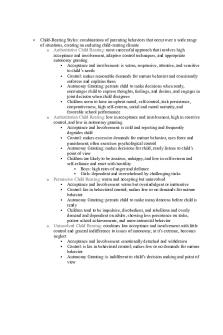Chapter 2 - Summary Developmental Psychology PDF

| Title | Chapter 2 - Summary Developmental Psychology |
|---|---|
| Author | Ariella Joffe |
| Course | Developmental Psychology |
| Institution | University of California Los Angeles |
| Pages | 1 |
| File Size | 53.6 KB |
| File Type | |
| Total Downloads | 92 |
| Total Views | 185 |
Summary
notes...
Description
130—Developmental Chapter 2—Research Strategies From Theory to Hypothesis
Hypothesis—prediction drawn from a theory
Common Research Methods
Naturalistic observation—go into the field, or natural environment, and record behavior of interest o Event sampling--# instances during specified time period o Time sampling—records whether behavior occurs during time interval Observer influence—effects of the observer on the behavior studied Observer bias—observers are aware of the purposes and record what they expect rather than what is actually done Self Reports: Interviews and Questionnaires o Clinical interview—researchers use a flexible, conversational style to probe for the participant’s point of view Problem of self report. Positive for display of thoughts in terms and provide large amount of info in brief period o Structured interview—all individuals asked the same set of questions in the same way Problem of inaccurate reporting Neurobiological methods—measure the r’ship btw NS processes and behavior o Use of reflexes to measure o EEG, fMRI, PET scan Clinical, or Case Study, Method o Clinical method—brings together a wide range of info on one child, including interviews, observations, test scores, and sometimes neurobiological measures o o
Reliability and Validity
Reliability—consistency of measures of behavior Validity—accurately measure characteristics that the research set out to measure
General Research Designs
Correlational—gather info in natural life circumstances. Look at r’ships btw participants’ characteristics and their behavior or development...
Similar Free PDFs

Chapter 1 Developmental Psychology
- 27 Pages
Popular Institutions
- Tinajero National High School - Annex
- Politeknik Caltex Riau
- Yokohama City University
- SGT University
- University of Al-Qadisiyah
- Divine Word College of Vigan
- Techniek College Rotterdam
- Universidade de Santiago
- Universiti Teknologi MARA Cawangan Johor Kampus Pasir Gudang
- Poltekkes Kemenkes Yogyakarta
- Baguio City National High School
- Colegio san marcos
- preparatoria uno
- Centro de Bachillerato Tecnológico Industrial y de Servicios No. 107
- Dalian Maritime University
- Quang Trung Secondary School
- Colegio Tecnológico en Informática
- Corporación Regional de Educación Superior
- Grupo CEDVA
- Dar Al Uloom University
- Centro de Estudios Preuniversitarios de la Universidad Nacional de Ingeniería
- 上智大学
- Aakash International School, Nuna Majara
- San Felipe Neri Catholic School
- Kang Chiao International School - New Taipei City
- Misamis Occidental National High School
- Institución Educativa Escuela Normal Juan Ladrilleros
- Kolehiyo ng Pantukan
- Batanes State College
- Instituto Continental
- Sekolah Menengah Kejuruan Kesehatan Kaltara (Tarakan)
- Colegio de La Inmaculada Concepcion - Cebu














